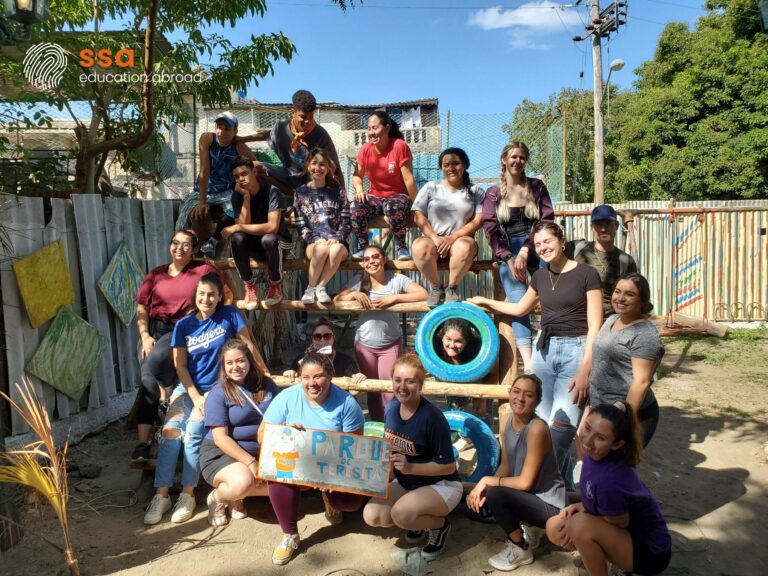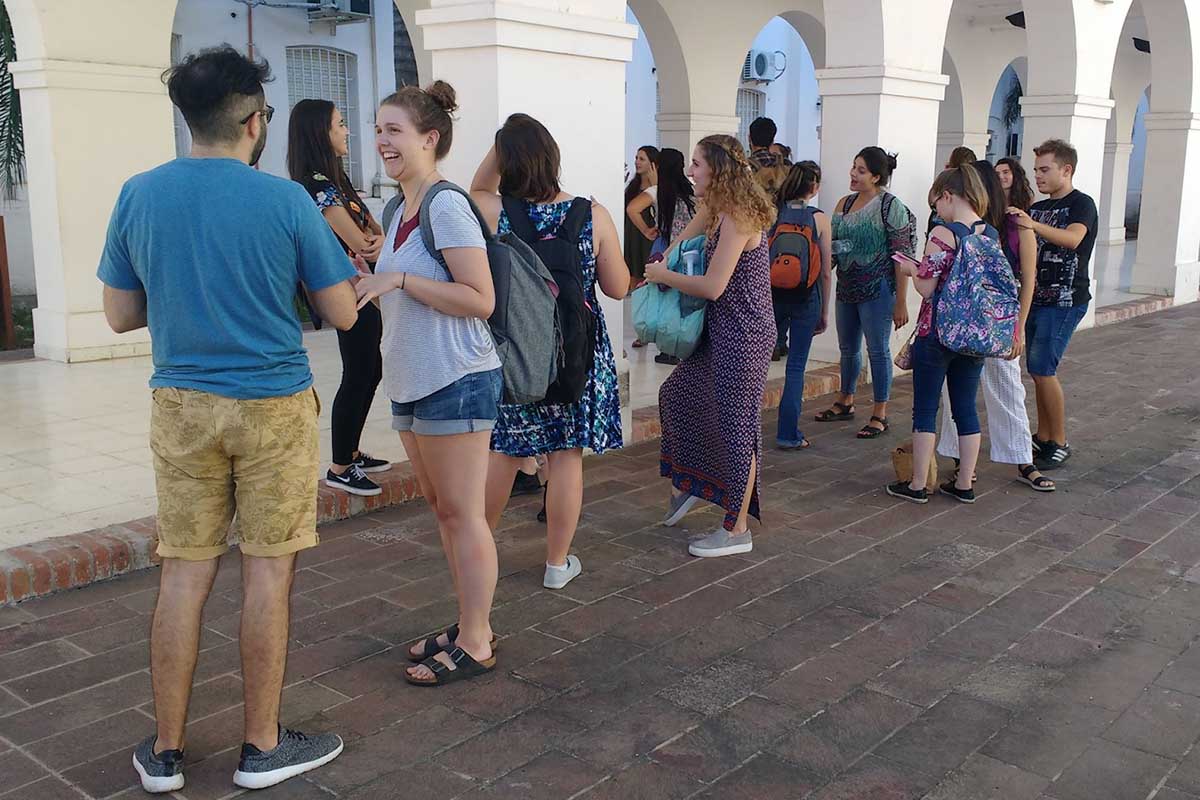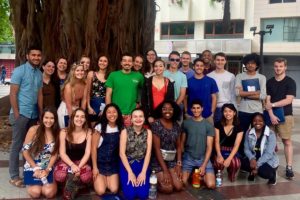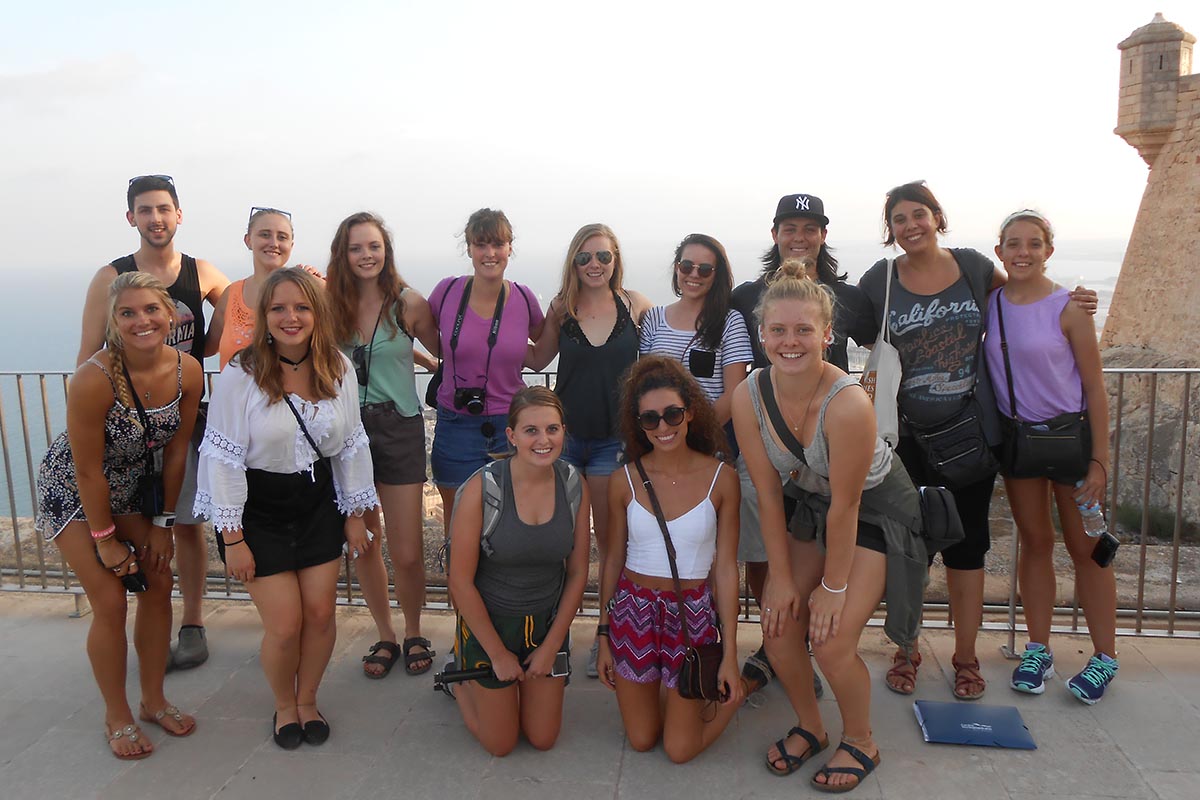
🌟 Embracing a New Chapter: Our Transformation to SSA Education Abroad
A New Era Unveiled Dear Esteemed Educators and Partners, In the spirit of renewal and progress, we’ve taken a monumental step forward. We’re thrilled to

Photo by: Kayla Rowe (Wake Forest University), Córdoba Spanish Studies Spring Semester 2018
Once you realize what study abroad is and that it interests you, the next big question is how to go about studying abroad.
This article will help you with essential questions and an overview of key issues to consider while considering study abroad options. If you are a college student in the USA, we will have information for you in each section.
Deciding to study abroad is an exciting moment in your life. If you take some time to plan carefully, you can turn that excitement into a meaningful experience to remember for the rest of your life. And make no mistake, there is a lot to consider.
We’ve also written extensively about why studying abroad is so beneficial, and key questions to ask yourself to know if you should study abroad at all. In case you don’t have time, here are the key takeaways:
Language experts agree that immersion in a foreign language is the best way to perfect it and turn it into a usable skill.
The type of program can vary greatly, depending on your situation. There are short-term commercial schools for working adults and university-type programs that focus on academic credits. Say, “Sí, sí, sí” to a new language.

Students on campus at the Universidad Nacional de Córdoba (Argentina)
Not only is it interesting to directly experience a culture, but it can help us grow as individuals. As we settle into our careers, we often no longer have the chance to immerse ourselves in a new culture. Plus, you’ll have great stories to tell!
Impress future employers or (post)graduate admissions boards with stories of learning and adapting to a different culture. Studying abroad can open doors to you as it allows you to stand out from the crowd. There are many new job opportunities overseas for study abroad students.
Few experiences are better at helping us reflect on our own culture(s) and priorities. Many people who study abroad return home changed from learning to see things through new filters. We grow by putting ourselves in situations that we are unsure we can handle and then succeeding. Returning study abroad students often note their increased self-confidence. Come back with you 2.0; you’ll be happy you did.
People in study abroad programs often comment that a week there is like a month back home, and this applies to new friends made overseas. This makes forming bonds far easier – everything, or almost everything, is a new adventure.
If you’re going on a semester program, you will meet students from around your home country and in your host country through student exchanges and other local activities. It’s now easy to stay in touch with these new friends through social media.



Exposure to a new culture – music, food, geography, social scenes, nightlife – means that you will discover new passions. And these passions can stay with you for a lifetime. Find your something through study abroad!
Seeing the world can become a challenge after you settle into a career job, so an overseas program when you’re an undergraduate is often the best opportunity. Students that study in Europe will often travel on weekends to see different corners of the Continent. See the world while you can!
Studying abroad is hard, or it can be, and there are many steps to go through. But it’s so worth it.
You will face challenges along the way, but overcoming each one will make you stronger and more confident. This is the point of studying abroad! Some of the obstacles include:
Find out more by clicking on the links
Historically, this has been the most common approach for students in North American colleges and universities. Many universities have pre-approved programs which can simplify the admissions process and often means that financial aid can be applied.
These programs were often tied to learning or perfecting a language. Still, now, study abroad programs can be found in almost any undergraduate discipline.
Some universities use providers, such as Spanish Studies Abroad, to arrange semester or academic year courses. These types of programs have evolved from a primary focus on language to now having courses in a wide-ranging area of disciplines. If you’re not a language student, many programs have coursework in English.
Universities often have relationships with other universities or providers. North American students should check with their global education office to see what options already exist.
Most universities also allow students to go through a provider outside of their regular offering and petition for transfer of credits toward their degree.
In the USA, short-term programs have flourished in recent years, allowing more students to have at least a taste of life abroad. Universities arrange these, and at least one professor leads them. Typically, the program is highly organized, with activities and accommodation all decided for you.
Many of these study-travel trips include elements of service-learning in communities where resources are scarce. Because these are arranged and run by colleges, they tend to take place during campus breaks and have relatively simple application processes.
Ambitious high school students can have a life-changing experience. Programs are typically semesters, academic years, or students going to another country for a full high school education outside their own country.
Language fluency must be considered when choosing a program like this. Organizations such as AYUSA and AIFS run programs for American students to go abroad and for overseas students to study in US public schools.
The most common program to study in the USA is on a “J” visa. These programs use volunteer schools and host families and are the least expensive. Other programs, such as Educatius, offer “F” visa programs in the USA. These allow students to choose where they wish to study through paid tuition and host families (or boarding schools). Educatius also offers high school years in many other countries for a wide range of nationalities.

Foundation programs are often one year of study in countries such as the UK and Australia as a “gap year” program to level up skills and academic credentials. Direct entry may not always be possible, as participants are often from countries whose education systems are viewed as being one year behind.
Their purpose is to improve skills for university success and to ensure that English proficiency requirements are met. If you have an interest in a university, check to see if it offers a foundation program. Keep in mind that many universities have made agreements with private providers such as INTO, Navitas, and Study Group.
In the USA and Canada, private providers such as those three have set up pathway agreements with universities. The primary outcomes of these pathways are English training while taking Year 1 (freshman) courses for credit. Students also have the chance to be accepted to a more selective university by doing a pathway year through a private provider.
Associate’s degrees typically take two years to complete. They are most often enrolled upon at institutions named “community colleges” (USA), “colleges” (Canada), or technical colleges. Some degrees, such as the Associate of Applied Science (AAS) are stand-alone, technical degrees.
An Associate of Science (A.S.) is often used for transferring into a four-year university. The first two years are taken at a community college, and the final degree is conferred at a university.
The 2+2 transfer model can be an excellent way to save money. It may be useful to achieve admission to a more prestigious university (similar to a pathway program). This approach is commonly used by students who seek entry to the prestigious University of California system.
Australia has a similar system to North America’s community colleges with its TAFEs. These can be used as a foundation, for stand-alone technical degrees or for the first year of university in Australia.
If you’re looking to do a degree outside your country, this is the most common credential. A typical North American degree is four years. Australia, New Zealand, and the UK are usually three; however, you may need a year-long foundation course first. This also applies to several other European countries.
Areas of study range broadly, from STEM programs (Science, Technology, Engineering, and Mathematics) to Business or the Humanities. Anglo countries are top-rated for international students, and the majority study in the areas of Business, Technology (computer-related), and Engineering.
Less common than Bachelor degrees for international students worldwide but still seen as attractive are Master’s degrees. Some students choose to do a Bachelor’s degree in their home country to save money and go abroad for this advanced credential.
Master’s degrees can vary from one year in the UK and Australia to 2 years, typically in North America. As with Bachelor’s degrees, the areas of study vary widely from STEM to popular MBA degrees in Business to just about any area of Social Sciences and the Humanities.
To gain admission, you generally need a Bachelor’s degree – with good grades – and possibly a test score (like the GRE or GMAT to demonstrate your “readiness”).
If your program of study is not in your mother tongue, you will need to prove your fluency in the language of instruction.
The highest academic credential to study abroad is at the doctoral level. A Ph.D. is a research degree for those who want to be professors or researchers in the public sector. In North America, most Ph.D. students are given scholarships in exchange for doing research. Their scholarships usually include stipends for living expenses. You certainly won’t get rich on these, but they make studying abroad much more affordable.
Other types of doctorates exist, such as the Ed.D., a doctorate in education. Most other formats are professional degrees with less of a research component.
When considering a doctorate, make sure to do some research on the number of expected years. A North American Ph.D. entails years of classes and examination before undertaking research, and can often take four to five years. In contrast, UK students begin their research almost immediately, and you might be able to finish in closer to 3 years.
Schools in this category vary broadly, from schools that cater to short-term programs – such as Dante Alighieri in Sienna – to those that focus on academic (university) credit, such as the Center for Cross-Cultural Study in Seville, Spain.
Which one is right for you depends on your needs and where you are in life. From the USA, the most common type of study abroad program is for undergraduate education. Participants receive academic credits to keep on track for graduation.
Many working professionals simply want to learn as much as they can in short breaks from their work. Sometimes they have the support of their companies, but it is also common to take vacation time to work on language skills that can give a career boost.
Speaking of career boosts, you can study abroad to improve in a particular area or skill. Some universities offer programs in summer months for executives and mid-level managers. These can be great for the material covered but also excellent networking opportunities. They can range from 2 weeks to 6 months.
If this could help you to advance, Google what is out there in your area of interest. Doing this training in another country adds value to the experience.
Internships are, of course, great ways to gain experience to land your career job. They can be tricky to obtain in your own country, and labor laws complicate getting some kind of “work” overseas.
Dual-nationality passport holders have some advantages by being able to work in more than one country. If this applies to you, boost your resume by finding a job in your “second” country during breaks from studies.
Consult with your university’s global education office and your academic department. Many have resources and useful contacts.
Be ready to work for free, and you may even have to pay for a service to find the best opportunities., so weigh up each option carefully. Also, be creative! Do your parents and their friends have overseas ties? Think about who is around you and the true reach of your network; they just might have a way to help you find an enriching experience.
Like internships, maybe this isn’t studying abroad. But it could be educational and enriching for you. Many organizations do inspiring work in economically disadvantaged areas. Many of these organizations arrange short developmental work (plumbing, construction, etc.) or educational work, such as helping to tutor young people in English.
Some universities now require some service learning, so you may want to fulfill those requirements overseas. You might even get college credit for the work, but what you can be sure of is 1. It can be a very memorable and compelling personal experience, and 2. It also looks good on your CV.
There are several standardized formats:
Some professors take guided ("faculty-led") programs during campus breaks that can be as short as 7 to 10 days. Most are no more than 3 weeks.
"Semester" in an academic setting means approximately 4 months (15 weeks is relatively standard in the USA).
This is often 9 months with breaks. Northern hemisphere countries might start in September and end in May.
Here are some general guidelines for how long degrees take: Associate degrees - 2 years; Bachelor degrees - 3 to 4 years; Master's degrees - 1 to 2 years; Doctorates - 3 to 5 years.
To answer this, we should distinguish between the “soft skills” – your personal traits – and what each program requires for admission. Here are some ways to start to make sure that the program you want will also want you:
Some programs are competitive and so they will not consider you if you have poor academic results.
Do you have the right personality to embark on new adventures and push yourself to the limits?
Maybe you’re too young to think of yourself as a “pro” but make sure you go to class, impress your teachers / professors because you may need letters of recommendation. Learn to understand both your academic interests and where your strengths lie. And budget your time so that you’re an expert at meeting deadlines and focusing on details.
Think ahead on the country (or countries) that you’re considering. If your course work will be in a different language, keep in mind some programs require a minimum language level. (At Spanish Studies Abroad, we can help with any level of Spanish so we got you!)
For adventurous high school students, a semester or a year abroad can be a great eye-opening experience. It also can be impressive for university admissions administrators. Most students who wish to finish high school in a given country are looking to go on for higher education there.
In certain parts of the world, such as the United Kingdom, a “gap year” has become a mainstream option. The idea behind it is to have a chance to mature – and have fun – before having to settle into the grind of a challenging university degree. Gap years can focus on work, service projects, or something like language learning.
This is the most common form of study abroad in the USA. Work with your college or university to determine the option that works best for your degree program.
This is less common than taking a gap year between high school and university. Keep in mind that it is easier to have an overseas adventure before settling into a career job. This can be a chance to perfect a language or take some practical courses that lead to micro-credentials. And we already know that an overseas experience is excellent for your resume.

Torre del Oro in Seville, Spain
Kate Allen (Berry College), Seville Spanish Studies Spring Semester 2018
Think long term and make a plan.
First, consider your goals. What are you trying to achieve by studying abroad?
Of course, what your plan looks like will vary greatly depending on the type of program. Any program that requires being admitted to a credit-bearing program is going to take more time.
Keep in mind that more prestigious universities make admission decisions in a specific cycle. You might apply in December and learn in March that you have been accepted to a university that begins its school year in September, for example. So you must understand the admissions process of the program.
Short-term language courses that do not involve credits are the most simple. If you want a program for college credit, consult with your university to make sure that these courses count for your degree program.
So, for academic study abroad, you should be thinking ahead of your ideal departure date by a year and a half to two years.
The other element to figure out is if a program (or academic institution) helps you meet your goals.
Fortunately, the internet makes this far more straightforward than it used to be. Start by researching the area of study and the country (or countries) that interest you the most. Be sure to look at multiple programs or universities of the type that interest you to give yourself a broader perspective. Gradually, you should be answering these questions:

Barcelona City View - Alexis Morillo (Ithaca College), Barcelona International Studies Spring Semester 2018
The application process for studying abroad can be as varied as the types of programs offered.
Full degree programs have the most steps and may have “selectivity”. In other words, they may only accept students who have an excellent academic history.
There are also some great services out there which help you to put together a top application.
Here are the documents that may be required for an academic program in a foreign country:
Academic programs want to know how you are doing at school or at your university. For a Bachelor or Associate degree, this could include all secondary and post-secondary grades. You may have to submit a translated and notarized copy of your transcripts if they are not in the target language. Programs for college credit require transcripts of all post-secondary work. High school programs will ask you to provide your secondary transcripts.
Any programs for Master’s and Ph.D. studies require official transcripts of all university studies.
If your coursework is in a given language, the educational provider will want to know how well can you speak the target language. For English, this could be in the form of a standardized test such as the IELTS or TOEFL.
North American college students who wish to undertake a program in, say, Spanish or French, may be evaluated on their grades in these subjects and feedback from your professors.
This may otherwise be known as a motivation letter/personal statement. For undergraduate admissions, this helps the university’s staff know if you are a match for their programs. Take your time to write a well-developed essay.
This is relatively standard in most programs from high school to doctoral studies. When you’re in school, always be thinking of what the teacher or professor would be willing to write you a good reference letter.
Some programs require personal interviews. The emergence of technology such as Skype and Zoom no longer means that you have to travel somewhere in person for an interview. Be ready to be your confident self; be clear on why this program or school is a match for you.
Your research should include finding out all key dates. Remember that applying for degree programs can require providing full applications 9 months before you plan to study. If you plan to do a university program, you may have two sets of deadlines. One from your university’s international education office and another from the study abroad provider.
Speak to your university about all of the options you have available. There are two key things to find out when discussing paying for your program with your international education office. Firstly find out whether any financial aid can be used. You may be able to use regular student loans. Secondly, are there scholarships at your university? Consider the following options:
Check these out to see which may apply to you:
Some countries have generous grants for visiting students. Here are a few but check your destination country to see if they have any scholarships:

Tapas (pintxos) in Northern Spain
Katie Mae Kaelin (St. Catherine University), Alicante International Studies Academic Year 2018-2019
This is a massive choice! If the housing ends up being wrong for you, it can affect your satisfaction with the experience. For language programs, we recommend homestays for better linguistic immersion. If you’re going to research at an overseas university, perhaps on-campus accommodation (or something near campus) would be best. Consider what your needs and preferences are and what your tolerance is for living in shared spaces.
Higher education can be costly, so this is a crucial consideration. You can find study abroad programs that end up less expensive than studying at a private university in the USA. Be sure to understand how you will have to pay – directly to the program, or will your university have you pay your regular, full tuition fees. In the meantime, you should consult articles on ideas for fundraising to kickstart your fund!
Parents want what’s best for their children but also have natural protective instincts. As in most cases, preparing yourself with facts is very useful. If your university has sent dozens of students to a given destination, your parents likely will not see it as a threatening environment. If you want to go somewhere more “adventurous”, do your homework. Information that might help you make your case: crime rates, number of visitors from your country, and travel advisories.
You should also be ready to show them what an overseas program will cost. It is useful if you can show that you may qualify for some special funding to lower the cost to close a similar fee to your home campus.
Also valuable is to remind them of how a study abroad experience can help to find a job, help you become more independent, and be an experienced problem-solver.

Zumba friends in Alicante, Serafima Zdjelar (Niagara University), Alicante Spanish Studies Spring Semester 2018
Don’t let the length of this article throw you off your dream of studying abroad. Millions of people choose to do it around the globe each year, so we hope you take our advice and think ahead, plan, and research.
Know what you need and what interests you as your starting points. Use the resources available – the internet, your family and friends, and staff at your university – to start to identify the type of program and possible destinations.
Next, study the financial realities, including the estimated costs, financial aid, and possible scholarships.
Once you’ve identified where to go, figure out the application process and other administrative tasks you need to complete. And closer to the time, study your destination and what you need to know about packing, clothing, and other necessities.
There are a plethora of resources available, so keep your eye on the prize. An overseas study and learning experience can enrich your life, and it can make you a more attractive candidate for a job or an academic program.
You can get there, and you’ll be glad that you did!

A New Era Unveiled Dear Esteemed Educators and Partners, In the spirit of renewal and progress, we’ve taken a monumental step forward. We’re thrilled to

In Seville, the reality of being a woman intertwines with a vibrant culture and a commitment to female empowerment, reflecting both the beauty and challenges

The mission of SSA is to promote our students’ in-depth understanding of Spanish-speaking countries through specifically designed and academically rigorous university-level and cultural travel programs.


Experience the Fusion of Cultures in San Juan’s SSA Adventure! 🌴📚🇵🇷

Dive into Authentic Cultural Immersion in the Heart of Argentina! 🇦🇷📚🌆

Navigate Through Panama’s Cultural Diversity with English Studies! 🛤️🌐🇵🇦

Venture into Patagonia’s Wild Beauty with the SSA Environmental Studies Program! 🏞️🔍🇦🇷🇨🇱

INSTITUTIONAL RELATIONS Manager
Beth is your go-to contact for navigating the complex process of study abroad.
She aims to respond to all inquiries within one business day.
Don’t hesitate to drop a message. No question is too small!
Trying to learn more about Study Abroad?
We’re sending you our A-Z study abroad guide, including:
